
Eugene Peterson in his foreword to one of Philip Yancey’s books
[1] recounts this story from his family’s memory bank:
“A favorite story in our home as our children were growing up was of John Muir at the top of the Douglas fir in the storm.
[2] Whenever we were assaulted by thunder and lightning, rain sluicing out of the sky, and the five of us, parents and three children, huddled together on the porch enjoying the dangerous fireworks from our safe ringside seat, one of the kids would say, ‘Tell us the John Muir story, Daddy.’ And I’ll tell it again.”
“In the last half of the nineteenth century, John Muir was our most intrepid and worshipful explorer of the western extremities of our North American continent. For decades he tramped up and down through our God-created wonders, from the Californian Sierras to the Alaskan glaciers, observing, reporting, praising, and experiencing—entering into whatever he found with childlike delight and mature reverence.”
“At one period during this time (the year was 1874) Muir visited a friend who had a cabin, snug in a valley of one of the tributaries of the Yuba River in the Sierra Mountains—a place from which to venture into the wilderness and then return for a comforting cup of tea.”
“One December day a storm moved in from the Pacific—a fierce storm that bent the junipers and pines, the madronas and fir trees as if they were so many blades of grass. It was for such times this cabin had been built: cozy protection from the harsh elements. We easily imagine Muir and his host safe and secure in his tightly caulked cabin, a fire blazing against the cruel assault of the elements, wrapped in sheepskins, Muir meditatively rendering the wilderness into his elegant prose. But our imaginations, not trained to cope with Muir, betray us. For Muir, instead of retreating to the coziness of the cabin, pulling the door tight, and throwing another stick of wood on the fire, strode out of the cabin into the storm, climbed a high ridge, picked a giant Douglas fir as the best perch for experiencing the kaleidoscope of color and sound, scent and motion, scrambled his way to the top, and rode out the storm, lashed by the wind, holding on to dear life, relishing weather; taking it all in—its rich sensuality, its primal energy.”
I am not surprised that this episode became a treasure in the Peterson family’s memory bank. I wonder what the story meant for Eugene’s children and what it inspired them to be and do. Like all good stories this one has many applications.
Here is Eugene’s application as he commends a book on Philip Yancey’s pilgrimage with the church:
“…this [story] became a kind of icon of Christian spirituality for our family…. A standing rebuke against becoming a mere spectator to life, preferring creature comforts to Creator confrontations.”
Geoff Pound
Image: John Muir among the pines
[1] Philip Yancey, Church:
Why Bother? My Personal Pilgrimage Grand Rapids, Michigan: Zondervan, 1998. This story by Peterson appears in the Foreword, 7-11.
[2] Edwin Way Teale, (ed.)
The Wilderness of John Muir Boston: Houghton & Mufflin, 1954, 181-90.
 After the ship the Titanic sank, one of the survivors told about a woman who had been allotted a place in a lifeboat. She said, “Can I go back to my room?” The sailor said, “Yes, you have got three minutes.”
After the ship the Titanic sank, one of the survivors told about a woman who had been allotted a place in a lifeboat. She said, “Can I go back to my room?” The sailor said, “Yes, you have got three minutes.”

 One of the many great monologues in the contemplative, existential, experimental film Waking Life is Soap Opera Woman's (Tiana Hux) response to bumping into The Dreamer (Wiley Wiggins) and explaining her need for human interaction:
One of the many great monologues in the contemplative, existential, experimental film Waking Life is Soap Opera Woman's (Tiana Hux) response to bumping into The Dreamer (Wiley Wiggins) and explaining her need for human interaction:
 Press Release: New Books By F W Boreham
Press Release: New Books By F W Boreham The Japanese author, Kosuke Koyama, once addressed a gathering in New Zealand.
The Japanese author, Kosuke Koyama, once addressed a gathering in New Zealand.

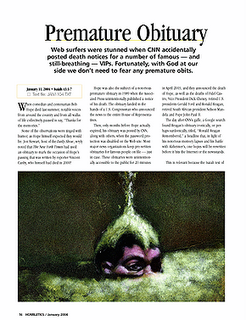


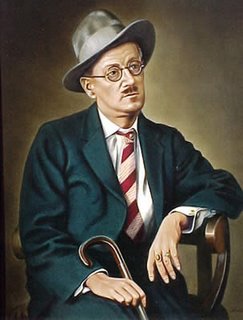 Story tellers like Agatha Christie, O’Henry, Jeffrey Archer, Dan Brown and J K Rowling have been popular because they keep you turning the pages and they are experts at writing conclusions.
Story tellers like Agatha Christie, O’Henry, Jeffrey Archer, Dan Brown and J K Rowling have been popular because they keep you turning the pages and they are experts at writing conclusions.
 A young couple had just got married and to celebrate they bought a large ham.
A young couple had just got married and to celebrate they bought a large ham. An old man was often sought out for advice and he was greatly admired for his wisdom.
An old man was often sought out for advice and he was greatly admired for his wisdom.



 The author Max Lucado writes:
The author Max Lucado writes: Entire TV commercials - perhaps you've seen them - have been based on the premise that some people and their pet dogs share a resemblance. Hmmm, well, maybe.
Entire TV commercials - perhaps you've seen them - have been based on the premise that some people and their pet dogs share a resemblance. Hmmm, well, maybe.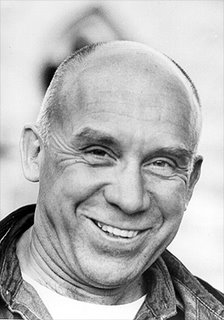
 Icons used to be the preserve of the Catholic and Orthodox churches. Those who ‘write’ icons and admire them say that not every icon has significance for them and even in the iconic tradition there are people for whom icons leave them cold. For others, ‘reading’ icons helps them to see and know more.
Icons used to be the preserve of the Catholic and Orthodox churches. Those who ‘write’ icons and admire them say that not every icon has significance for them and even in the iconic tradition there are people for whom icons leave them cold. For others, ‘reading’ icons helps them to see and know more. “The scoreboard said I lost today,” Andre Agassi told the crowd. “But what the scoreboard doesn’t say is what it is I have found. Over the last 21 years, I have found loyalty. You have pulled for me on the court and also in life.
“The scoreboard said I lost today,” Andre Agassi told the crowd. “But what the scoreboard doesn’t say is what it is I have found. Over the last 21 years, I have found loyalty. You have pulled for me on the court and also in life. A. S. Byatt’s Booker Prize winning book, Possession, is a fascinating novel published in 1990 and was transformed in 2002 into a film.
A. S. Byatt’s Booker Prize winning book, Possession, is a fascinating novel published in 1990 and was transformed in 2002 into a film. Everlasting Explorers
Everlasting Explorers
 Philip Yancey offers these words about church in describing his personal pilgrimage:
Philip Yancey offers these words about church in describing his personal pilgrimage: Some time back I attended a training day where we had all been asked to come along with an object that might help to introduce ourselves.
Some time back I attended a training day where we had all been asked to come along with an object that might help to introduce ourselves.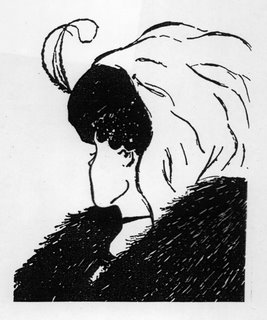
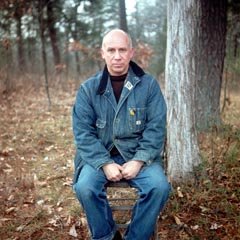 My wife and I are relishing the recent memories of over five weeks traveling around Italy. We learned a lot and enjoyed walking in the footsteps of people such as Ambrose, Augustine, Catherine, Francis, Clare and Anthony.
My wife and I are relishing the recent memories of over five weeks traveling around Italy. We learned a lot and enjoyed walking in the footsteps of people such as Ambrose, Augustine, Catherine, Francis, Clare and Anthony.